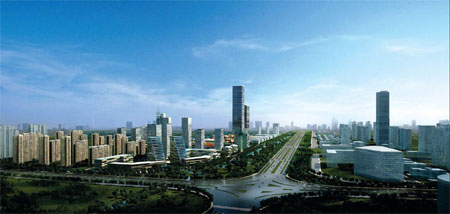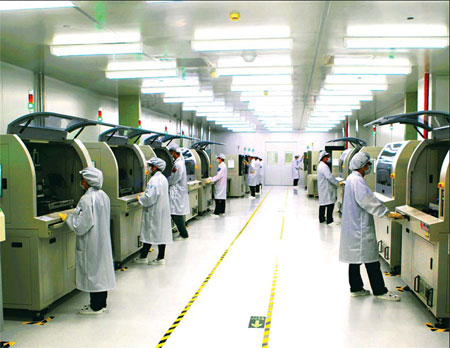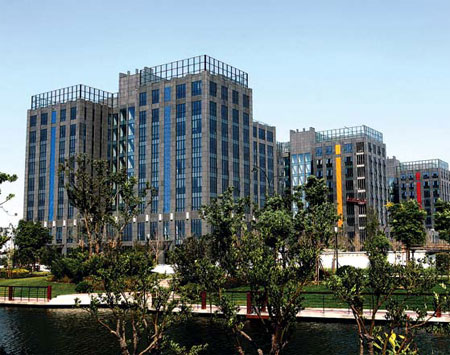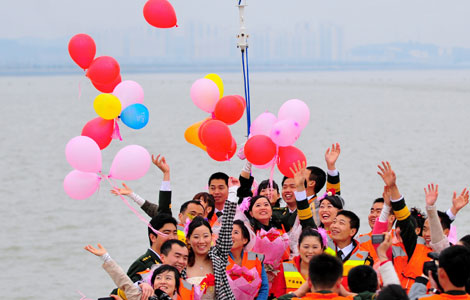Coastal zone hungry for foreign capital
Updated: 2012-03-15 08:08
By Ding Congrong in Nantong (China Daily)
|
|||||||||||
|
The eastern part of the Xinghu Block in the Nantong Economic and Technological Development Zone. |
|
Workers process components for LED lighting in a workshop of Tsinghua Tongfang Co Ltd inside the zone's LED industrial cluster. |
|
A service outsourcing center in the zone. |
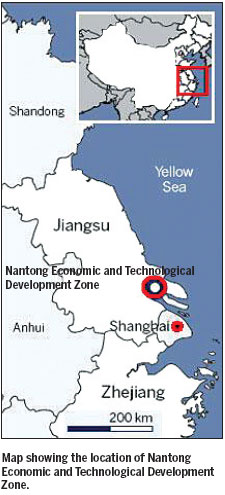
The Nantong Economic and Technological Development Zone in the eastern coastal province of Jiangsu is one of the 10 development zones in China with the largest investment potential for multinational corporations, local officials say.
Authorized by the Chinese government in December 1984, the zone is located on the southeastern side of Nantong. It covers 147 square kilometers and houses 140,000 permanent residents.
The zone's efforts to attract foreign investment have paid off, with investments flowing in from businesses based in more than 30 countries and regions.
The zone now hosts a high concentration of foreign enterprises in the Yangtze River Delta. More than 700 foreign-owned enterprises have been set up in the zone, about 60 of which are owned by Fortune 500 companies.
Many companies in the zone have achieved the highest international standards in terms of production capacity and technology.
There are six industrial clusters in the zone: modern equipment manufacturing, new materials, new medicine, new energy, modern textiles and service outsourcing.
The zone is strategically positioned along the Yangtze River Delta and it has easy access to nearby transportation infrastructure, such as waterways, highways and airports.
Three bridges pass through it: the Suzhou-Nantong Yangtze River Bridge, the Chongming-Qidong Yangtze River Bridge and the Shanghai-Nantong Railway Bridge, which will be under construction soon.
Thanks to the Suzhou-Nantong Yangtze River Bridge, the world's largest cable-stayed bridge, the zone is one hour's ride away from Shanghai Hongqiao Airport and three hours away from 10 major cities in the Yangtze River Delta.
The zone is reachable by three highways: the Shenyang-Haikou Highway, the Nanjing-Qidong Highway and the Jiangsu Waterfront Highway. It is also reachable by three railways: the Xinyi-Changxing Railway, the Nanjing-Qidong Railway and the Shanghai-Nantong Railway, which will soon be completed.
The zone has three airports in its vicinity: Hongqiao Airport, Pudong Airport and Nantong Airport, which will soon be built.
It also has the Port of Nantong, one of China's top 10 ports, which handles 200 million tons of cargo annually.
The Nantong Economic and Technological Development Zone has facilities and a natural environment that make it attractive to investors. For one, the terrain of the zone is flat, making it suitable for large construction projects.
Streets form a dense network linked with highways to nearby cities. Rainwater is collected in a system separate from sewage water. The main streets are 50 meters in width, and other streets are 25 meters in width. There are rainwater and sewage tunnels at the roadsides.
The supply of electricity is ample and stable. Nantong is one of China's major electricity-generating bases. Electricity is generated by thermal power, wind energy and bioenergy. The zone has three power transmission stations capable of generating 220 kilovolts and nine power transmission stations with a 110-kilovolt capacity.
It also has ample water supply. Two water plants, the Honggang and Langshan water plants, each produce 600,000 tons daily. Water prices in Nantong are the lowest out of all major Jiangsu cities.
There are two sewage-treatment plants, which are capable of processing 260,000 tons daily. Polluted water is released only after being processed and reaching a certain standard.
The zone is equipped with advanced telecommunication technology. Services such as international and domestic calls, broadband access to the Internet, satellite TV services and facsimile are available.
Nantong is rich in human resources as well, housing six colleges and 27 vocational schools. The city has a large supply of skilled workers and professionals. Labor prices are lower than surrounding areas, particularly the southern Yangtze River Delta.
To support the development of industry and business, Nantong has promulgated many favorable policies: administrative fees are reduced or waived; relevant government organs have improved their efficiency; tax policies have been skewed in favor of investors.
Foreign enterprises that have operated in China for 10 years or more are entitled to reward in proportion to their income tax to local authorities. Major science and technology projects are entitled to science advancement awards. The city government is also providing incentives in an attempt to encourage enterprises to expand their R&D investments.
Talent programs are being devised to support the development of the zone, namely the "Jianghai Talent Program" and the "Xinghu Talent Program". The former is targeted at the whole city, and the latter is specifically targeted at the zone itself.
Special funds have been earmarked to encourage companies to settle in the zone. The funds will be used to help companies to rent, buy or construct their own office buildings.
The zone provides a favorable environment not only to business but also for its residents. It is home to Ruici Hospital, one of China's largest comprehensive hospitals, as well as first-rate international schools. The zone harbors high-end apartments and restaurants. Also, Scenic Langshan Mountain and Haohe River are nearby.
The Nantong Economic and Technological Development Zone has five parks and three sub-zones.
The electronics park covers 378 hectares and mainly focuses on photoelectron technology, photo communication, microelectronics, integrated circuits and LEDs. The first phase of Tsinghua Tongfang Computer's 6-billion-yuan ($951 million) project has been completed, and production has started.
The precision machinery park covers 535 hectares and hosts companies that make precision molds, machinery and electronic machinery. Of these, the most famous are Jingji Electronic Mechanics and Wangao Machinery.
The medical park covers 173 hectares and includes companies that sell medicine and medical equipment. The park is devoted to industrialization and development of high-end medical products.
The new materials park covers 1,000 hectares and is focused on batteries, nuclear power equipment, organic high-polymer materials and new-alloy materials. Chenhua Chemistry, China's largest producer of Styrene Butadiene rubber, has established its presence in the park.
The equipment-production park covers 500 hectares. In 2011, the park was recognized with the title "New Industrial Park" by the city government. It specializes in port equipment and vessel production.
The Nantong zone also includes Daneng Business Zone, an authorized provincial-level district for the modern service industry. It is focused on business service, innovative design, service outsourcing, technology R&D as well as electronic commerce. Since its inception in May 2008, it has attracted investments totaling 6 billion yuan.
The Nantong Free Trade Zone consists of two parts. Part A is located in what was previously called the "exported manufactured goods area", and Part B is located to the east of the Suzhou-Nantong Yangtze River Bridge and to the south of the Jiangsu Waterfront Highway.
The two parts will utilize their respective advantages and have different focuses in an attempt to make this zone a driving force for the improvement of trade quality and regional economic development.
The Urban and Rural Business Zone is intended to be a comprehensive business hub for trade and cargo.
With the rigorous efforts of Nantong authorities and its favorable position, the Nantong Economic and Technological Development Zone is set to become more dynamic, serving as a driving force of the Yangtze River Delta economy.
dingcongrong@chinadaily.com.cn
(China Daily 03/15/2012 page12)
Hot Topics
Wu Ying, iPad, Jeremy Lin, Valentine's Day, Real Name, Whitney Houston, Syria,Iranian issue, Sanyan tourism, Giving birth in Hong Kong, Cadmium spill, housing policy
Editor's Picks

|

|

|

|

|

|
